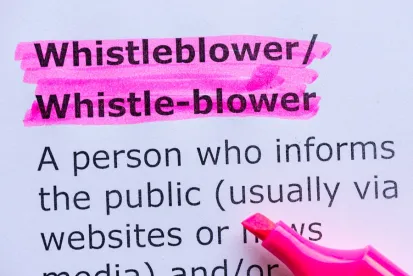The Eastern District of Pennsylvania recently granted immunity under the whistleblower provision of the Defend Trade Secret Act in what appears to be the first decision of its kind under the new federal trade secret statute. The DTSA’s whistleblower immunity safe harbor protects employees from civil or criminal liability for a confidential disclosure of trade secrets to an attorney “solely for the purpose of reporting or investigating a suspected violation of law.” There have been relatively few decisions interpreting this section of the DTSA since its enactment, all of which found that the whistleblower provision was not satisfied. See, e.g., Unum Grp. v. Loftus, 220 F. Supp. 3d 143 (D. Mass. 2016). With the first decision granting immunity under the whistleblower provision, litigants now have further guidance as to circumstances where the whistleblower provision may apply.
In Christian v. Lannett Co., Civil Action No. 16-963 (E.D. Pa. Mar. 29, 2018), Defendant Lannett Co., Plaintiff’s former employer, brought a counterclaim under the DTSA for trade secret misappropriation after Plaintiff filed a discrimination suit under Title VII of the Civil Rights Act of 1964, the Americans with Disabilities Acts, and the Family and Medical Leave Acts. Defendant’s DTSA counterclaim focused on the contention that after Plaintiff’s employment was terminated she retained over 22,000 pages of her former employer’s confidential material. Plaintiff disclosed this material to her counsel who in turn produced it to Defendant in response to Defendant’s discovery requests related to the discrimination claims. Plaintiff moved to dismiss the DTSA claim, arguing that she was immune from liability “because the only alleged disclosure of trade secrets which took place after the effective date of the [DTSA] occurred through a production of documents provided to her attorneys in confidence, pursuant to federal discovery requirements.”
The Court agreed with Plaintiff. After recognizing that “the DTSA provides immunity for the disclosure of a trade secret ‘in confidence…to an attorney…solely for the purpose of reporting or investigating a suspected violation of law,’” the Court found that the production of Defendant’s alleged trade secret material fell within the whistleblower immunity safe harbor because “Plaintiff’s alleged disclosure was made to Plaintiff’s counsel pursuant to a discovery Order of this Court, within the context of a lawsuit regarding violations of Title VII, the ADA, and the FMLA.” In coming to this decision, the Court also noted that Defendant alleged no facts to indicate that Plaintiff’s counsel intended to disclose the alleged trade secret material to anyone other than Defendant, who is the owner of the alleged trade secret material.
This decision provides welcome guidance regarding the circumstances in which the whistleblower safe harbor will apply. We continue to monitor the growing body of law concerning the whistleblower provision of the DTSA and will provide further updates as courts further address this provision. In the meantime, we are available to answer any DTSA or trade secret questions you may have.





 />i
/>i

